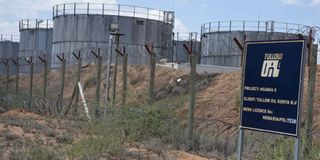Why Tullow was forced to halt its force majeure plan

Tullow Oil storage tanks in Lokichar, Turkana County.
What you need to know:
- Force majeure refers to a clause that is included in contracts to remove liability for natural and unavoidable catastrophes should they come to pass.
- Tullow had called a force majeure on its licences in Turkana, essentially stopping work.
- This was due to effects of restrictions caused by coronavirus on the company’s work programme and tax changes in Kenya.
Kenya rejected Tullow Oil’s freeze of Turkana project resulting in the latest move to lift a force majeure announced in May.
Petroleum Principal Secretary Andrew Kamau told the Nation that the British oil explorer did not give sufficient reasons for freezing its work in Kenya, reversing a bid to halt operations in the arid northern Kenya.
Force majeure refers to a clause that is included in contracts to remove liability for natural and unavoidable catastrophes should they come to pass.
The revelation contradicts an explanation given by Tullow partner Africa Oil Corporation that the lifting was due to ‘improvement in Covid-19 pandemic restrictions worldwide and the resumption of local and international flights.’
“We didn’t agree with the reasons given for the force majeure and they have now lifted it. We can now expect everything to progress within the agreed timelines including a full field development plan and all the obligations,” Mr Kamau said.
Covid-19 effects
Tullow had called a force majeure on its licences in Turkana, essentially stopping work due to effects of restrictions caused by coronavirus on the company’s work programme and tax changes in Kenya.
The explorer said it had stopped the clock on the licences with the time accrued under force majeure expected to be added to the end of the licence when it would be lifted.
In April, Kenya proposed tax measures to remove Value Added Tax exemption on taxable supplies, imported or purchased for direct and exclusive use in geothermal, oil or mining prospecting or exploration.
Tullow said the move differed significantly from regional benchmarks in the oil and gas sector, pushing to have its reversal during the force majeure.
The three months freeze on the Turkana oil project presents a setback on the timeline with the final investment decision having been pushed a number of times to the latest 2021 target.
The explanation on why the explorer suspended the force majeure offers a decent cover over disagreements Tullow had with the Kenya Government over the sudden freeze on the project and follows previous fall outs between the government and the explorer.





